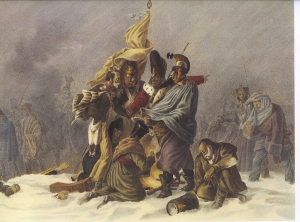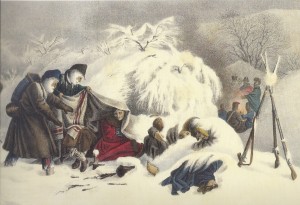On the morning of the 15th, Napoleon’s advance guard continued its march to Krasnoe. Ségur describes how the column came across the Russian army which had passed the Grande Armée and was waiting across the road: “… advancing without precaution, preceded by a crowd of marauders, all eager to reach Krasnoe, when at about five miles from that town a row of Cossacks, extending from the heights on the left and across the highroad, suddenly appeared before them. Our soldiers halted, astounded. They had not expected anything of the kind…”
Adrian Bourgogne of the Imperial Guard picks up the narrative: “… the front of the Imperial columns was stopped by 25,000 Russians occupying the road. Stragglers at the front caught sight of them first, and immediately turned back to join the first regiments advancing; the greater part of them, however, united and faced the enemy. A few men, too careless or too wretched to care what they did, fell into the enemy’s hands.”
“The Grenadiers and Chasseurs, formed into close columns, advanced against the mass of Russians, who, not daring to wait for them, retired and left the passage free; they took up a position on the hills to the left of the road, and turned their artillery on us. When we heard the cannon, we doubled our pace, as we were behind, and arrived just as our gunners were answering them. The Russians disappeared behind the hills as our fire began, and we continued our way.”
“In two hours after the encounter with the Russians, the Emperor reached Krasnoe with the first regiments of the Guard — ours and the Fusiliers-Chasseurs. We camped behind the town. I was on guard with fifteen men at General Roguet’s quarters: a miserable house in the town, thatched with straw. I put my men in a stable, thinking myself in luck to be under cover, and near a fire we had just lighted, but it turned out quite otherwise.”
“While we were in Krasnoe and the immediate neighborhood, the Russians, 90,000 strong, surrounded us – to right, to left, in front, and behind, nothing but Russians — thinking, no doubt, they could soon finish us off. But the Emperor wished to show them it was not quite so easy a thing as they imagined; for although we were most wretched, and dying of cold and hunger, we still possessed two things – courage and honour.”
“On the evening of our arrival, General Roguet received orders to attack during the night… at two o’clock [a.m.] we began to move forward. We formed into three columns… The cold was as intense as ever. We had the greatest difficulty in walking across the fields, as the snow was up to our knees. After half an hour of this, we found ourselves in the midst of the Russians. On our right was a long line of infantry, opening a murderous fire on us, their heavy cavalry on our left… They howled like wolves to excite each other, but did not dare to attack. The artillery was in the centre, pouring grape-shot on us. All this did not stop our career in the least. In spite of the firing, and the number of our men who fell, we charged on into their camp, where we made frightful havoc with our bayonets.”
Tomorrow, the battle continues.
Source:
Sergeant Bourgogne: With Napoleon’s Imperial Guard in the Russian Campaign and on the Retreat from Moscow 1812-13, Adrien Bourgogne, pp 102 – 105
Commemorative 1912 Russian Candy Box Card image and translation provided by Alexey Temnikov






